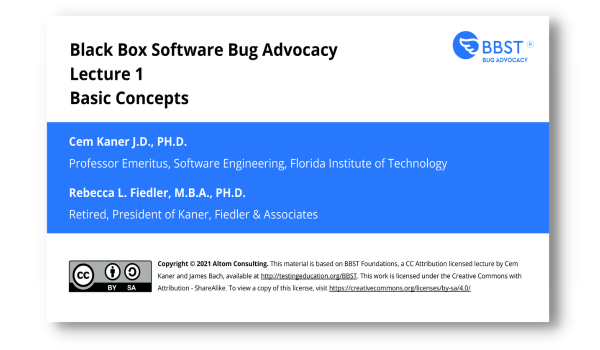The Black-Box Software Testing series is the most extensive and scientifically based software testing training materials. The BBST® courses have been developed by Cem Kaner and Rebecca Fiedler over a 10-year period. The theoretical lectures, slides & videos, for the first 3 courses in the BBST® series (version 3.0) are licensed to the public under a Creative Commons Attribution license. Anyone can use those materials in their academic, personal, or commercial courses without further permission from or royalty to anyone. The letters “BBST” may not be applied to other black box software testing courses or materials without prior arrangements with Altom Consulting SRL.
BBST® Bug Advocacy is designed to be the second course in the series. To fully benefit from this educational program we recommend registering for an online class. The depth and relevance of the learning experience, coupled with the individual feedback each student receives, offers an unequaled level of progress only through an online class.
By studying the open course materials you get access to the lecture slides and videos, but do not have access to the orientation exercises, assignments, exam and feedback from instructors or peers.
BBST® Bug Advocacy Video Lectures
Lecture 1 – Basic Concepts
In this 35-minute lecture, Kaner explores a range of definitions for basic concepts including “quality” and “bug.” He also presents the multi-dimensional view of quality used throughout the BBST® courses.
Lecture 2 – Making People Want to Fix the Bug
Lecture 2 focuses on how to develop bug reports that clearly communicate bugs in their best and most honest light so that decision-makers can operate with the best possible information.
Lecture 3 – Writing Clear Bug Reports
In this lecture, Cem Kaner introduces the RIMGEN (or RIMGEA) acronym to guide testers in writing better bug reports. We have created a set of printable cards with illustrations for each step of the bug investigation guide. You can download them here.
Lecture 4 – Anticipating and Dealing with Objections: Irreproducible Bugs
In this lecture, Kaner presents strategies to help testers explore non-reproducible bugs so they are reproducible. He also discusses how tracking non-reproducible bugs can help troubleshooting efforts.
Lecture 5 – Bugs that Could Be Dismissed as Unreasonable, Unreaslistic, or Unimportant
This lecture focuses on overcoming objections, by understanding why a bug could be rejected. You will go through a list of reasons why programmers might resist spending time on a bug and how your investigation and reporting efforts can influence this for the better.
Lecture 6 – Credibility and Influence
In addition to the quality of bug reports, a tester’s actions can influence how much credibility and influence they have on a project. This lecture draws on research on bias and signal detection theory to explore some of the things that enhance or diminish a tester’s credibility.

